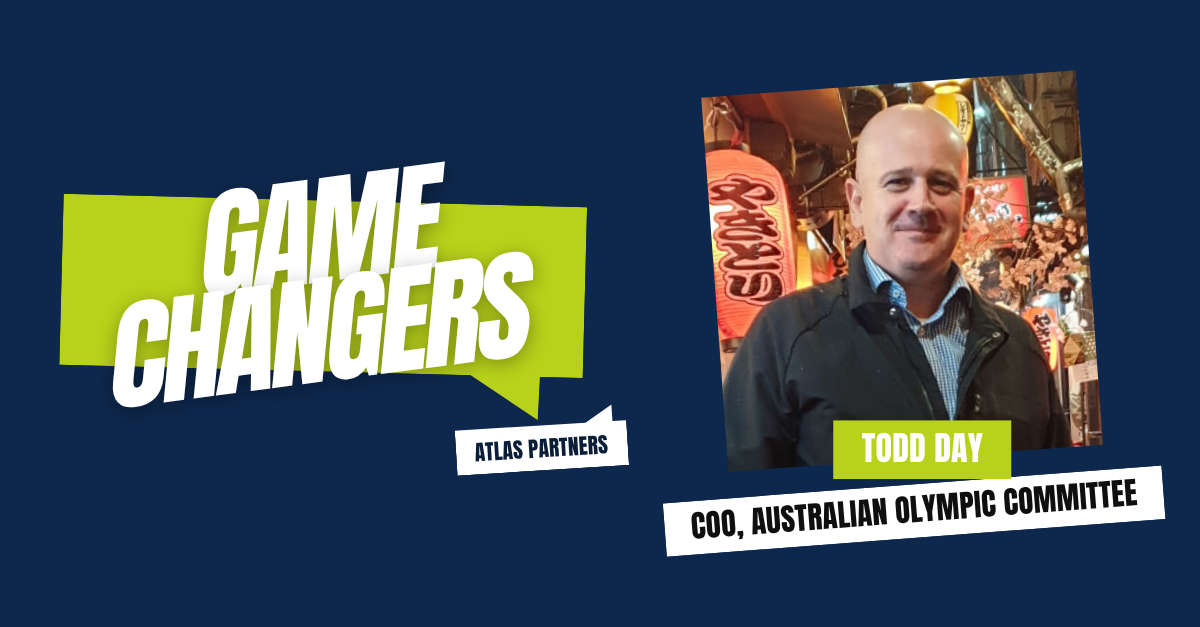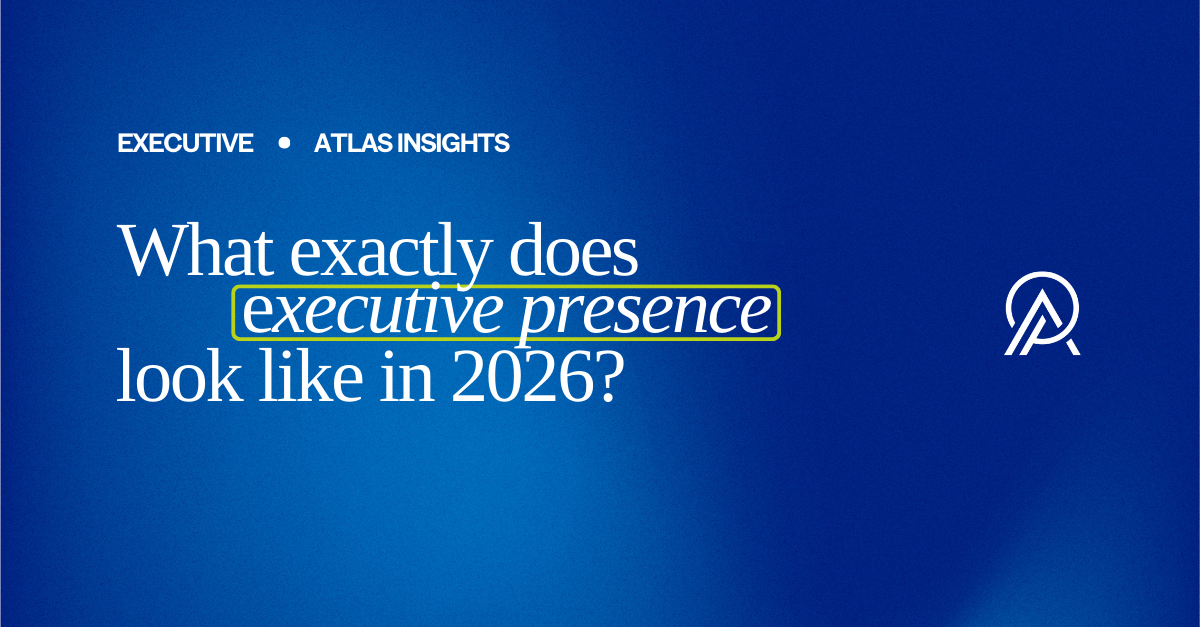
From rugby to the rings — Todd Day on leading through sport’s biggest shifts. In this episode of Game Changers, Liam Killen, Director of Atlas Partners sits down with Todd Day, Chief Operating Officer of the Australian Olympic Committee, to unpack a career that’s spanned finance, media, and some of the most high-stakes decisions in Australian sport. From rebuilding NSW Rugby and navigating economic turbulence at Rugby Australia, to delivering Tokyo 2020 and shaping the road to Brisbane 2032, Todd shares candid reflections on leadership, legacy, and the complex business of sport.
Liam Killen: Welcome to Game Changers. I’m Liam Killen and I’m joined today by Todd Day, the Chief Operating Officer of the Australian Olympic Committee. Todd, thanks for joining us.
Todd Day: Pleasure, Liam.
Liam Killen: Todd, we’ll be exploring the interesting career that you’ve had to date, particularly as you’ve led through change in sport and the Olympic movement. But before we get there, I’d love to explore your early career. Can you take us back to your early days in the Big Six and into media and entertainment?
Todd Day: Yeah, it seems like a long time ago now—I’m showing my age a bit—but I joined one of the Big Six back in the early ’90s. I joined one of their undergraduate programs. So, straight out of school, you’d do full-time work and part-time uni, swapping over every couple of semesters. That was with Coopers & Lybrand, which is now part of PwC.
It was a great grounding. Those firms are really good to build your professional foundation, especially in accounting. You get good exposure to good people, good clients, and you learn a lot. I know there’s a mix of people who do the undergraduate path versus the graduate path, but I believe my undergrad experience was very, very good. You learn a lot on the go, and it really aids in getting through your university degree and your Chartered Accounting program. I can’t fault it, and I recommend it to any aspiring accountant. It’s a great way to start.
Liam Killen: Can you talk us through those early leadership experiences with the Waratahs and Rugby Australia?
Todd Day: Sure. I didn’t move directly into sport. Straight out of Chartered Accounting, I went into the media industry and spent about 10 years there, which was a great learning ground for commerce. Definitely an interesting industry—learning around media and IP. I worked in two Australian companies. The first had international exposure with a head office overseas, so I got some great experience in integration and head office reporting. The second was a local Australian company, which in various iterations was ASX-listed.
It was great experience—probably 10 years in media—and at the time it was growing with the introduction of pay TV into Australia. Again, showing my age—pay TV in the mid-90s.
Out of that, I moved into sport. I think I just fell into it. I wasn’t planning it as my next career stage—I was just looking for a different industry. I applied for a job I found in the paper with NSW Rugby Union, which also managed the Waratahs. It was a business coming out of some tough times financially. It had gone through a management process under Australian Rugby at the time. It was starting fresh, rebuilding. It appealed to me at the time, and I’m glad I did it.
I spent about five years there. Being a smaller business, you were exposed to a lot of things—brand, commercial, sponsorships—and you learned how to work in a high-performing environment. It was great for my own career and the way I approached work.
Liam Killen: That led to your move to Rugby Australia?
Todd Day: Yes. I got the opportunity after a conversation with John O’Neill, the CEO at the time—highly respected in rugby and Australian sport more broadly. He offered me a role at Rugby Australia. Initially, I wasn’t in a finance role. For the first 18 months I was managing the Super Rugby competition in Australia. That competition was tri-nation—Australia, New Zealand, and South Africa.
We introduced the Melbourne Rebels during that period. It was a broad role—operational, commercial, and international. We were dealing with our South African and New Zealand counterparts and with World Rugby. It really broadened my experience and helped me think differently—how to deal with non-financial people, and how to make decisions outside of the finance bubble.
After 18 months, John moved me into the CFO role. The CFO at the time had moved on, and I stepped up. That’s when it all really started in terms of the economic challenges that Rugby was facing. Issues that had been bubbling away for years were now hitting hard.
The expansion of Super Rugby to five teams caused problems—we spread the talent pool too thin. That impacted success at the Super level, which then flowed on to Wallabies performance. And when the team isn’t performing, it hits gate revenues, commercial, broadcast—everything. You end up in a vicious cycle.
And in professional sport, the cost base is huge—especially player payments. You’ve got broadcast and commercial obligations. You can’t easily reduce costs. The only option is to cut other areas—often community programs, which is sad because participation is what drives the next generation of fans and players. It’s a tough place to be.
Probably the hardest moment was the Western Force decision. We went through a wide-ranging process and ended up removing a team from the competition. It’s all public, but it was incredibly hard. I remember my CEO saying it was like being in a boat and having to throw one of your kids overboard. That’s how difficult it was.
Liam Killen: Do you think, with hindsight, those tough decisions protected the game?
Todd Day: I think they did. They were necessary. Then COVID came, layering in new challenges. And while I’ve been out of Rugby Australia for a while, I still keep in touch. The same issues are there—depth of talent, competition from other codes. Rugby’s become almost a niche sport in Australia, which is a pity. It’s very hard to compete with the AFL and NRL in a small population market.
That said, the Wallabies remain a great international brand. The British and Irish Lions tour this year is a big moment. It’s galvanising. Fans travel from the UK, the whole country gets behind it. If you get a chance—go. It’s a fantastic event.
Liam Killen: Let’s shift to the AOC. You’ve been there seven years and led some major initiatives. Can we talk about Tokyo 2020 and Brisbane 2032?
Todd Day: Absolutely. The AOC is still sport, but it’s a very different business. It’s a member-based organisation—we have around 50 sports, both Summer and Winter Olympic disciplines. They range in size—from big pro sports like tennis and football to tiny ones that run off a kitchen table.
We’re there to advocate for all of them. Our role is more than just delivering the Olympic Games—it’s to promote Olympism in Australia.
COVID hit hard. The Tokyo 2020 Games were postponed, not cancelled—unprecedented. Even in 2021, staging them was incredibly complex. We had to send a team of 1,000 people into Tokyo, manage their return, and deal with strict quarantine rules across multiple states. It was a massive coordination effort.
During that period, we were also working with the Brisbane 2032 bid team. The Queensland Government was the lead, but we were a major stakeholder. We had to negotiate the commercial terms, model our expected revenue losses, and strike a deal. When the announcement came at the Tokyo Games, it was a huge moment.
Liam Killen: Beyond the Games, you also oversee the AOC’s $200 million foundation. What role does that play?
Todd Day: The foundation dates back to the 2000 Games. There was a big commercial windfall—about $90 million—that was invested. The IOC changed the rules after that, so it was a one-off. But we’ve grown that to around $190 million today.
We manage it closely with our investment advisors and an investment committee. It’s not part of the sports operation, but it’s hugely important. It funds about 30% of our revenue annually. Without it, we’d be a very different business.
Liam Killen: And what gives you the most satisfaction in your role?
Todd Day: For me, it’s the ecosystem. A lot of people say they’re passionate about sport—and that’s great—but I try to look at it differently. I love the business of sport. At Rugby, I saw community, high performance, international relations, commercial and brand work. That complexity is what I find interesting.
Compared to FMCG or banking, sport is more dynamic. The highs and lows are immediate. What happens on the field affects everything off it. Being part of that system is rewarding. And occasionally, like during Games time, you see performances that are just incredible. You’re not the one running or swimming, but you feel part of it.
Liam Killen: Do you see yourself staying on through to Brisbane 2032?
Todd Day: We work in four-year cycles. My current focus is on LA 2028. That might sound far away, but it’s not—after the Winter Games in 2026, we’ll be just 18 months out from LA.
We’ll see how I feel then. Brisbane is a long way off. It’ll depend on whether I’ve got the energy—not the passion, but the drive—to go again.
Liam Killen: How do you define success in your career?
Todd Day: For me, it’s about satisfaction in what you’ve achieved. Building resilience. The finance role in sport can be really tough—there are a lot of misconceptions about what finance people do or should do.
Looking back at tough periods like the Western Force decision, I’ve learned a lot. You go through conflict, but later on, you can sit down with those people and still have a relationship. That means something.
Success is also about knowing you made a contribution to a good business. Finance gives you visibility across everything—use that knowledge.
Liam Killen: Any advice for finance professionals looking to broaden into operations roles?
Todd Day: Don’t be afraid to put your hand up. Try new things—IT projects, capex work, whatever comes. I once project-managed a center of excellence build—completely new to me, but I learned a lot.
In small-to-medium businesses, finance sees everything. That gives you credibility. Back yourself.
Liam Killen: Final one—what’s your favourite Olympic moment?
Todd Day: That’s an easy one. Saya Sakakibara winning gold in BMX. Incredible story. It’s about resilience, hard work, and family. Look it up—it’s inspirational.
Liam Killen: Todd Day, thank you so much for joining us.
Todd Day: Thanks, Liam. Pleasure.
About Game Changers
Game Changers: The business of sport and entertainment — is a podcast that goes behind the scenes with the CFOs, COOs and Executives shaping the industry. Each episode dives into the commercial strategies, career journeys, and financial decisions driving success in Australian sport, media and entertainment. If you’re curious about what happens beyond the scoreboard or the stage, this is where the real game is played — Listen on Spotify




